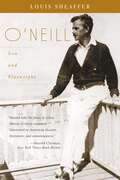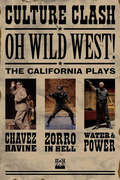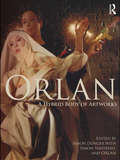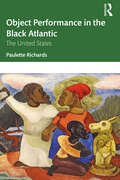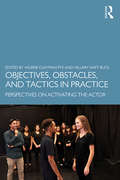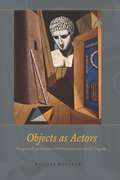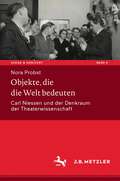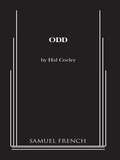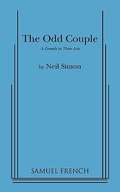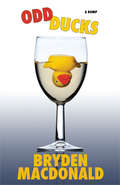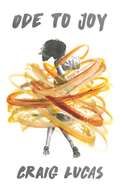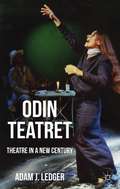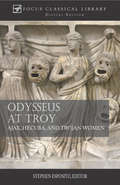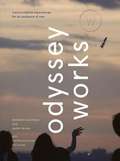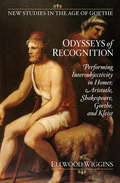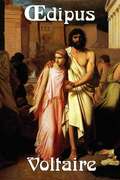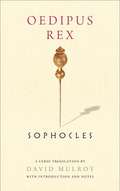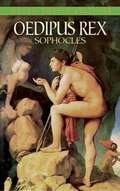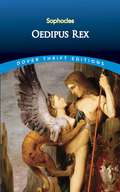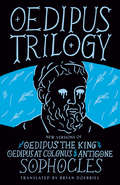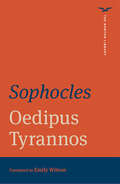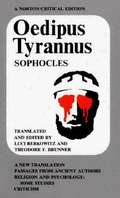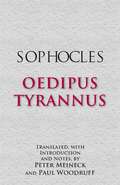- Table View
- List View
O'Neill: Son and Playwright
by Louis ScheafferThe most lauded playwright in American history, Eugene O'Neill (1888-1953) won four Pulitzer Prizes and a Nobel Prize for a body of work that includes The Iceman Cometh, Mourning Becomes Electra, Desire Under the Elms, and Long Day's Journey into Night. His life, the direct source for so much of his art, was one of personal tumult from the very beginning. The son of a famous actor and a quiet, morphine-addicted mother, O'Neill had experienced alcoholism, a collapse of his health, and bouts of mania while still a young man. Based on years of extensive research and access to previously untapped sources, Sheaffer's authoritative biography examines how the pain of O'Neill's childhood fed his desire to write dramas and affected his artistically successful and emotionally disastrous life.
O'Neill: Son and Playwright, Volume 1
by Louis SheafferWinner of the Theater Library Association's George Freedley Memorial Award as the Best Theater Book of 1968. This is the first volume of Pulitzer Prize-winning Louis Sheaffer's monumental biography of America's greatest playwright. Here is groundbreaking information on every aspect of O'Neill's life up to 1920, when he was launched on Broadway with the opening of "Beyond the Horizon." Louis Sheaffer spent sixteen years researching and writing his well-honored biography. For his work on O'Neill Mr. Sheaffer was awarded three Guggenheim fellowships, two grants-in-aid by the American Council of Learned Societies, and a grant by the National Endowment for the Humanities.
OH, WILD WEST!
by Culture Clash"Midway through Water & Power comes a scene so perfectly written, so chilling and yet so hilarious [it] encapsulates all the anger and social criticism fueling [the play], beginning with the agonizing realization (also central to Culture Clash's smash Chavez Ravine) that the fates of the L.A. many are held in the hands of the often capricious and heartless few."--VarietyFor Zorro in Hell:"The funniest show the Bay Area comedy troupe has ever written. Culture Clash uses the story [of Zorro] as a starting point for a devastatingly hilarious satire of just about everything Californians hold dear."--Contra Costa TimesIn this trio of plays, Culture Clash rewrites California's past in the performance troupe's own irreverent comic style, interweaving pop culture with their home state's local history. In Chavez Ravine, called "a hell-raising home run" by Variety, they cover the land grab that uprooted an entire community and built Dodger Stadium. In Water & Power, the topic is the assimilation of Latinos and their rise to political influence. And in Zorro in Hell, Culture Clash re-imagines early California through the eyes of the original masked man.Culture Clash is Richard Montoya, Ric Salinas, and Herbert Siguenza. Founded in San Francisco's Mission District on Cinco de Mayo in 1984, they have become the most prominent Chicano/Latino performance troupe in the United States. Their work ranges from sketch comedy to full-length plays and adaptations of Greek classics, and has been produced at universities and theaters throughout the country.
ORLAN: A Hybrid Body of Artworks
by Simon DongerORLAN: A Hybrid Body of Artworks is an in-depth academic account of ORLAN's pioneering art in its entirety. The book covers her career in performance and a range of other art forms. This single accessible overview of ORLAN's practices describes and analyses her various innovative uses of the body as artistic material. Edited by Simon Donger with Simon Shepherd and ORLAN herself, the collection highlights her artistic impact from the perspectives of both performance and visual cultures. The book features: vintage texts by ORLAN and on ORLAN's work, including manifestos, key writings and critical studies ten new contributions, responses and interviews by leading international specialists on performance and visual arts over fifty images demonstrating ORLAN's art, with thirty full colour pictures a new essay by ORLAN, written specially for this volume a new bibliography of writing on ORLAN an indexed listing of ORLAN’s artworks and key themes.
Object Performance in the Black Atlantic: The United States
by Paulette RichardsGiven that slaveholders prohibited the creation of African-style performing objects, is there a traceable connection between traditional African puppets, masks, and performing objects and contemporary African American puppetry? This study approaches the question by looking at the whole performance complex surrounding African performing objects and examines the material culture of object performance. Object Performance in the Black Atlantic argues that since human beings can attribute private, personal meanings to objects obtained for personal use such as dolls, vessels, and quilts, the lines of material culture continuity between African and African American object performance run through objects that performed in ritual rather than theatrical capacity. Split into three parts, this book starts by outlining the spaces where the African American object performance complex persisted through the period of slavery. Part Two traces how African Americans began to reclaim object performance in the era of Jim Crow segregation and Part Three details how increased educational and economic opportunities along with new media technologies enabled African Americans to use performing objects as a powerful mode of resistance to the objectification of Black bodies. This is an essential study for any students of puppetry and material performance, and particularly those concerned with African American performance and performance in North America more broadly.
Objectives, Obstacles, and Tactics in Practice: Perspectives on Activating the Actor
by Valerie Pye Hillary BucsObjectives, Obstacles, and Tactics in Practice is the first book that compiles practical approaches of the best practices from a range of practitioners on the subject of working with Stanislavski’s "objectives," "obstacles," and "tactics." The book offers instructors and directors a variety of tools from leading acting teachers, who bring their own individual perspectives to the challenge of working with Stanislavski’s principles for today’s actors, in one volume. Each essay addresses its own theoretical and practical approach and offers concrete instructions for implementing new explorations both in the classroom and in the rehearsal studio. An excellent resource for acting and directing instructors at the university level, directing and theatre pedagogy students, high school/secondary theatre teachers, and community theatre leaders, Objectives, Obstacles, and Tactics in Practice serves as a resource for lesson planning and exploration, and provides an encyclopedia of the best practices in the field today.
Objects as Actors: Props and the Poetics of Performance in Greek Tragedy
by Melissa MuellerObjects as Actors charts a new approach to Greek tragedy based on an obvious, yet often overlooked, fact: Greek tragedy was meant to be performed. As plays, the works were incomplete without physical items—theatrical props. In this book, Melissa Mueller ingeniously demonstrates the importance of objects in the staging and reception of Athenian tragedy. As Mueller shows, props such as weapons, textiles, and even letters were often fully integrated into a play’s action. They could provoke surprising plot turns, elicit bold viewer reactions, and provide some of tragedy’s most thrilling moments. Whether the sword of Sophocles’s Ajax, the tapestry in Aeschylus’s Agamemnon, or the tablet of Euripides’s Hippolytus, props demanded attention as a means of uniting—or disrupting—time, space, and genre. Insightful and original, Objects as Actors offers a fresh perspective on the central tragic texts—and encourages us to rethink ancient theater as a whole.
Objekte, die die Welt bedeuten: Carl Niessen und der Denkraum der Theaterwissenschaft (Szene & Horizont. Theaterwissenschaftliche Studien #4)
by Nora ProbstDas Buch widmet sich in wissenschaftsgeschichtlicher Perspektive den Anfängen der Theaterwissenschaft in Köln. Es untersucht die Wissenschaftspraktiken des Kölner Institutsgründers Carl Niessen (1890–1969), der das Fach als Forscher, Dozent, Sammler und Kurator über einen Zeitraum von rund 40 Jahren geprägt hat. Besonderes Augenmerk legt diese erste wissenschaftsgeschichtliche Monografie über Niessen auf dessen erweitertes Theaterverständnis, das den Bogen von rituellen Handlungen und cultural performances bis hin zu den Phänomenen des europäischen Gegenwartstheaters spannte. – Ausgangspunkt der Studie ist das Gebäude des im Zweiten Weltkrieg zerstörten Theatermuseums am Salierring in Köln. Durch das virtuelle Abschreiten der Museumsräume werden die durch Niessen initiierten Praktiken der frühen Theaterforschung und -lehre kartografiert und vor dem Hintergrund der Fachentwicklung analysiert.
Occult Knowledge, Science, and Gender on the Shakespearean Stage
by Mary Floyd-WilsonBelief in spirits, demons and the occult was commonplace in the early modern period, as was the view that these forces could be used to manipulate nature and produce new knowledge. In this ground-breaking study, Mary Floyd-Wilson explores these beliefs in relation to women and scientific knowledge, arguing that the early modern English understood their emotions and behavior to be influenced by hidden sympathies and antipathies in the natural world. Focusing on Twelfth Night, Arden of Faversham, A Warning for Fair Women, All's Well That Ends Well, The Changeling and The Duchess of Malfi, she demonstrates how these plays stage questions about whether women have privileged access to nature's secrets and whether their bodies possess hidden occult qualities. Discussing the relationship between scientific discourse and the occult, she goes on to argue that as experiential evidence gained scientific ground, women's presumed intimacy with nature's secrets was either diminished or demonized.
Odd
by Hal Corley2m, 2f / Drama / Unit Set / Anna Marie has raised her surly, contentious son Micah alone. Though Micah has long been pharmaceutically treated for his O.D.D. — Oppositional Defiance Disorder — she's desperate to introduce a paternal influence. Anna Marie hires Joe Eskin, an itinerant waiter with a vague past and take-no-prisoners tutoring style. Over one critical autumn Joe brings focus and structure to Micah's daily life. But as he opens incurious Micah's eyes to a world outside his sleepy New Jersey suburb, Joe ingratiates himself into the family and inadvertently stirs in Anna Marie dormant romantic longing. In a revelatory battle royal, Micah realizes that equally combative Joe is a kindred spirit — likely "O.D.D." himself. When Micah attracts the brilliant but volatile Ilona, Joe's Cyrano-like coaching to help Micah romance the older girl segues into near obsession. Though smitten Anna Marie remains oblivious, Ilona slowly realizes that Joe's emotional investment in Micah is invasive and threatening. During a Halloween trip into rain-drenched New York City, Ilona ends Joe's control by confronting him in front of Micah, with life-altering results. Exploring the challenges of teen isolation, single parenting, and our dependence on drug therapy as a panacea, ODD illuminates the terror and heartbreak that bind a unique quartet. / "The transformation of the fringe player to someone possibly acceptable by mainstream or even upper-class society, the man who breezes into town and energizes the young man with a disability, the man with troubles of his own who solves a family's troubles: These are classic human stories and ODD melds them well while bringing them to 2007…ODD asks who is broken — the people whose disorders are gaping, bleeding wounds, or the people weighed down by their life challenges…The winner of Premiere Stages' Play Festival, ODD is an important work at a time when befuddled parents want to fix their kids with a pill: better living through chemistry.” - Gannett/Home News Tribune
Odd Couple: A Comedy in Three Acts
by Neil SimonThis classic comedy opens as a group of the guys assembled for cards in the apartment of divorced Oscar Madison. And if the mess is any indication, it's no wonder that his wife left him. Late to arrive is Felix Unger who has just been separated from his wife. Fastidious, depressed and none too tense, Felix seems suicidal, but as the action unfolds Oscar becomes the one with murder on his mind when the clean-freak and the slob ultimately decide to room together with hilarious results as The Odd Couple is born.
Odd Ducks
by Bryden MacdonaldWelcome to the small town of Tartan Cross, Nova Scotia, where skeletons rattle in closets and past histories are so intertwined that the lives of four fortysomething, eccentric characters have become so complicated that something needs to change. In the comedy, Odd Ducks, award-winning playwright Bryden MacDonald positions his four characters at the brink of existential angst - and the action unfolds from there.At the centre of the drama is Ambrose Archibald, an irredeemable reprobate and the type of guy who rants philosophically at the bar while mooching beer from his friends. He's a narcissist who thinks he's God's gift to women. And he's having an affair with the charming and beautiful Mandy Menzies, who was the high school beauty queen but is now stuck in a marriage of convenience and a life of boredom. Her housekeeper, Estelle Carmichael, has seen it all, but her prickly exterior belies a loving heart. The dryly funny Freddy Durdle is the perfect counter-balance to over-the-top Ambrose.All four oddballs seem stuck in their lives, but searing sarcasm relieves the boredom and crazy, everyday dramas aid their struggle to move on and keep things lightCast of 2 women and 2 men.
Ode to Joy (TCG Edition)
by Craig Lucas"Irresistible . . . intoxicating. . . . Enduringly original sensibility."--New York TimesAdele is a painter and an addict. Through her eyes, we meet her two lovers, Mala and Bill, and follow her destructive relationships over the course of fourteen years. A vulnerable exploration of the interplay between art, love, and addiction, Ode to Joy is an affecting new drama from respected playwright Craig Lucas.Renowned playwright Craig Lucas's newest work is a sensitive look at illness, addiction, and love.Craig Lucas's plays include Missing Persons, Reckless, Blue Window, Prelude to a Kiss, God's Heart, The Dying Gaul, Stranger, Small Tragedy, Prayer for My Enemy, The Singing Forest, and the book for the The Light in the Piazza (music and lyrics by Adam Guettel).
Odin Teatret: Theatre in a New Century
by Adam J. LedgerFocusing on Odin Teatret's latest work, this discussion is updated by drawing on fresh research. The group's productions since 2000 are included and the book offers a reassessment of Odin's actor training. Its community work and legacy are discussed and Barba's intercultural practice is viewed alongside two major Theatrum Mundi productions.
Odysseus at Troy: Ajax, Hecuba and Trojan Women
by Sophocles Euripides Diskin Clay Robin Mitchell-Boyask Stephen EspositoThis book contains translations of three plays:Ajax, Hecuba, and Trojan Women. They are all centered around the mythological theme of the Greek warrior, Odysseus, hero of the Trojan War. All three plays are complete, with notes and introductions, plus an introduction to the volume with background to the story which was one of the most popular themes and one of the most written about Greek hero in Greek literature. Written during a tumultuous age of sophists and demagogues, these three plays (c. 450-425 BCE) bear witness to the gradual degradation of Odysseus' character. In presenting the unexpected devolution of a renowned mythic figure, the plays examine numerous themes relevant to contemporary American political life: the profound psychological consequences of brought on by the stress of war and why a once proud and noble warrior might commit suicide; and the dehumanizing darkness that descends upon innocent female war-victims when victors use act on false political necessity.
Odyssey Works: Transformative Experiences for an Audience of One
by Rick Moody Abraham Burickson Ayden LerouxOdyssey Works infiltrates the life of one person at a time to create a customtailored, life-altering performance. It may last for one day or a few months and consists of experiences that blur the boundaries of life and art--is that subway mariachi band, used book of poetry, or meal with a new friend real or a part of the performance? Central to this book is their 2013 performance for Rick Moody, author of The Ice Storm. His Odyssey lasted four months and included a fake children's book, introducing the themes of his performance, and a cello concert in a Saskatchewan prairie (which Moody almost missed after being stopped at customs with, suspiciously, no idea why he was traveling to Canada). The book includes Moody's interviews with Odyssey Works, an original short story by Amy Hempel, and six proposals for a new theory of making art.
Odysseys of Recognition: Performing Intersubjectivity in Homer, Aristotle, Shakespeare, Goethe, and Kleist (New Studies in the Age of Goethe)
by Ellwood WigginsLiterary recognition is a technical term for a climactic plot device. Odysseys of Recognition claims that interpersonal recognition is constituted by performance, and brings performance theory into dialogue with poetics, politics, and philosophy. By observing Odysseus figures from Homer to Kleist, Ellwood Wiggins offers an alternative to conventional intellectual histories that situate the invention of the interior self in modernity. Through strategic readings of Aristotle, this elegantly written, innovative study recovers an understanding of interpersonal recognition that has become strange and counterintuitive. Penelope in Homer’s Odyssey offers a model for agency in ethical knowledge that has a lot to teach us today. Early modern and eighteenth-century characters, meanwhile, discover themselves not deep within an impenetrable self, but in the interpersonal space between people in the world. Recognition, Wiggins contends, is the moment in which epistemology and ethics coincide: in which what we know becomes manifest in what we do. Published by Bucknell University Press. Distributed worldwide by Rutgers University Press.
Oedipus
by VoltaireŒdipus was written when Voltaire was but nineteen years of age. It was played for the first time in 1718, and ran for forty-five nights. Du Frêsne, a celebrated actor, and of the same age as the author, played the part of Œdipus; and Madame Desmarêts, a famous actress, did Jocaste, and soon after quitted the stage. In this edition, the part of Philoctetes is restored, and stands exactly as it was in the first representation. Wilder Publications is a green publisher. All of our books are printed to order. This reduces waste and helps us keep prices low while greatly reducing our impact on the environment.
Oedipus Rex
by David MulroyOedipus Rexis the greatest of the Greek tragedies, a profound meditation on the human condition. The story of the mythological king, who is doomed to kill his father and marry his mother, has resonated in world culture for almost 2,500 years. But Sophocles' drama as originally performed was much more than a great story--it was a superb poetic script and exciting theatrical experience. The actors spoke in pulsing rhythms with hypnotic forward momentum, making it hard for audiences to look away. Interspersed among the verbal rants and duels were energetic songs performed by the chorus. David Mulroy's brilliant verse translation ofOedipus Rexrecaptures the aesthetic power of Sophocles' masterpiece while also achieving a highly accurate translation in clear, contemporary English. Speeches are rendered with the same kind of regular iambic rhythm that gave the Sophoclean originals their drive. The choral parts are translated as fluid rhymed songs. Mulroy also supplies an introduction, notes, and appendixes to provide helpful context for general readers and students.
Oedipus Rex
by SophoclesOne of the greatest of the classic Greek tragedies and a masterpiece of dramatic construction. Catastrophe ensues when King Oedipus discovers he has inadvertently killed his father and married his mother. Masterly use of dramatic irony greatly intensifies impact of agonizing events. Sophocles' finest play, Oedipus Rex ranks as a towering landmark of Western drama. Explanatory footnotes. Translated by Sir George Young.
Oedipus Rex
by SophoclesConsidered by many the greatest of the classic Greek tragedies, Oedipus Rex is Sophocles' finest play and a work of extraordinary power and resonance. <P><P>Aristotle considered it a masterpiece of dramatic construction and refers to it frequently in the Poetics. <P>In presenting the story of King Oedipus and the tragedy that ensues when he discovers he has inadvertently killed his father and married his mother, the play exhibits near-perfect harmony of character and action. <P>Moreover, the masterly use of dramatic irony greatly intensifies the impact of the agonizing events and emotions experienced by Oedipus and the other characters in the play. <P>Now these and many other facets of this towering tragedy may be studied and appreciated in Dover's attractive inexpensive edition of one of the great landmarks of Western drama. <P>A selection of the Common Core State Standards Initiative.
Oedipus Trilogy: New Versions of Sophocles' Oedipus the King, Oedipus at Colonus, and Antigone
by SophoclesFresh, new translations of Sophocles's three Theban plays by acclaimed theater director Bryan Doerries, which emphasize the contemporary relevance of these classic Greek tragedies.Here are Oedipus the King, Oedipus at Colonus, and Antigone in fresh new versions for contemporary readers and audiences. Each has been the basis for groundbreaking theatrical performances by Theater of War Productions, in which actors present dramatic readings, followed by town hall-style discussions. These forums are designed to confront social issues by evoking raw, personal reactions to themes highlighted in the plays. The Oedipus Project is an innovative digital initiative that presents scenes from Oedipus the King as a catalyst for frank and restorative online conversations about the impact of the COVID-19 pandemic on diverse communities. First performed in 429 BC during the time of a plague that killed one-third of the Athenian population, it is a story of arrogant leadership, ignored prophecy, and a pestilence that ravages the city of Thebes—a story that is as relevant now as it was in its own time. The Oedipus at Colonus Project presents readings of scenes from Sophocles&’ final play, Oedipus at Colonus, for powerful, community-driven conversations about homelessness, the immigration and refugee crises, and the challenges of eldercare during and after the pandemic.Antigone in Ferguson is a pioneering project that fuses dramatic readings from Antigone with live choral music, culminating in powerful, healing discussions about race and social justice. Antigone in Ferguson was conceived in the wake of Michael Brown's death in 2014, through a collaboration between Theater of War Productions and community members from Ferguson, Missouri, and premiered at Normandy High School, Michael Brown's alma mater.
Oedipus Tyrannos (The Norton Library #0)
by Sophocles"Oedipus?Tyrannos?is the first Greek play many readers encounter, and this version is their ideal gateway. Emily Wilson's verse line is effortlessly graceful, whether in taut, tense dialogue exchanges or in the lyrical choral odes.”? —JAMES ROMM,?Bard College??
Oedipus Tyrannus
by Sophocles Theodore F. Brunner Luci BerkowitzThe text is accompanied by a wealth of carefully chosen background materials and essays. "Passages from Ancient Authors" includes selections from Homer's Odyssey, Thucydides' account of the plague, and Euripedes' Phoenissae. The best of ancient and modern criticism is represented, encouraging discussion from psychological, religious, anthropological, dramatic, and literary perspectives. Under the heading "Religion and Psychology" are included writings on the Oedipus myth by Martin P. Nilsson, Meyer Fortes, Gordon M. Kirkwood, Thalia Phillies Feldman, and Sigmund Freud. The authors of the selections in "Criticism" are Aristotle, C. M. Bowra, R. C. Jebb, S. M. Adams, A. J. A. Waldock, Albin Lesky, Werner Jaeger, Friedrich Nietzsche, John Jones, D. W. Lucas, Bernard M. W. Knox, Cedric H. Whitman, Richmond Lattimore, Robert Cohen, Francis Fergusson, and H. D. F. Kitto. The special question of Oedipus's guilt or innocence is addressed in essays by J. T. Sheppard, Laszlo Versenyi, P. H. Vellacott, E. R. Dodds, Thomas Gould, and Philip Wheelwright.
Oedipus Tyrannus
by Sophocles Paul Woodruff Peter MeineckPeter Meineck and Paul Woodruff's collaboration on this new translation combines the strengths that have recently distinguished both as translators of Greek tragedy: expert knowledge of the Greek and of the needs of the teaching classicist, intimate knowledge of theatre, and an excellent ear for the spoken word. Their Oedipus Tyrannus features foot-of-the-page notes, an Introduction, stage directions and a translation characterized by its clarity, accuracy, and power.
